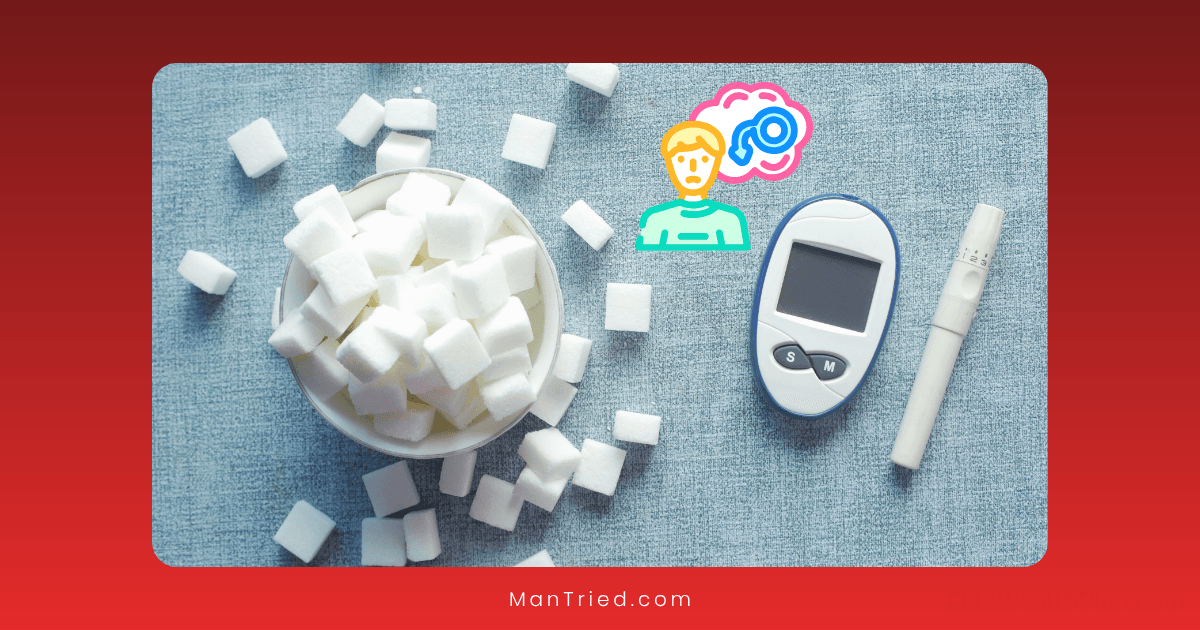The Diabetes-ED Connection: Managing Both Conditions Effectively

When John, a 52-year-old accountant, was diagnosed with type 2 diabetes five years ago, he focused on the obvious concerns—monitoring blood sugar, adjusting his diet, and taking medication. What his doctor didn’t thoroughly discuss was how diabetes might affect his sexual health. Three years after his diagnosis, John began experiencing erectile dysfunction (ED), a complication that left him feeling isolated and confused.
“I thought it was just age or stress,” John recalls. “I had no idea it was directly connected to my diabetes. If I’d known, I might have managed my blood sugar more aggressively from the beginning.”
John’s experience is remarkably common. The link between diabetes and erectile dysfunction is strong, widespread, and often overlooked in routine diabetes care. Understanding this connection can be crucial for both prevention and effective management.
The Alarming Statistics
The numbers tell a compelling story about the diabetes-ED connection:
- Men with diabetes are approximately 3.5 times more likely to develop erectile dysfunction compared to men without diabetes, according to research published in PMC.
- The overall prevalence rate of ED in patients with diabetes is 52.5%, with 37.5% in type 1 diabetes and 66.3% in type 2 diabetes.
- Half of men diagnosed with diabetes will experience erectile dysfunction within ten years of their diagnosis, as reported by the University of Utah Health.
- For approximately 12% of diabetic patients, erectile dysfunction is actually their first symptom—appearing before they even know they have diabetes.
- By 2025, more than 322 million men worldwide are projected to have erectile dysfunction, with diabetes being a primary driver of this increase.
“These statistics aren’t just numbers,” explains Dr. Sarah Chen, endocrinologist at Cleveland Medical Center. “They represent millions of men experiencing a significant impact on their quality of life and relationships. The good news is that with proper management of both conditions, many men can maintain or regain sexual function.”
Why Diabetes Leads to Erectile Dysfunction
Understanding the physiological connection between diabetes and ED helps explain why the two conditions are so frequently linked:
1. Vascular Damage
Diabetes damages blood vessels through several mechanisms:
- Endothelial dysfunction: High blood sugar impairs the lining of blood vessels, reducing their ability to dilate and allow increased blood flow.
- Atherosclerosis: Diabetes accelerates the buildup of plaque in arteries, narrowing vessels that supply blood to the penis.
- Microvascular damage: Smaller blood vessels are particularly vulnerable to damage from diabetes, affecting the intricate vascular network in the penis.
“Erections are fundamentally a vascular event,” explains Dr. Robert Williams, urologist. “They require healthy blood vessels that can rapidly expand to allow increased blood flow. Diabetes systematically damages these vessels over time.”
2. Nerve Damage (Neuropathy)
Diabetes is notorious for damaging nerves throughout the body:
- Autonomic neuropathy: Affects the nerves that control involuntary functions, including the nerves that trigger erections.
- Peripheral neuropathy: Reduces sensation in the penis, decreasing arousal and response to physical stimulation.
- Pudendal nerve damage: Impairs the specific nerve pathway crucial for erectile function.
3. Hormonal Imbalances
Diabetes can disrupt the delicate hormonal balance necessary for sexual function:
- Low testosterone: Men with diabetes, particularly type 2, often have lower testosterone levels, which affects libido and erectile function.
- Insulin resistance: Affects hormone production and sensitivity throughout the body.
- Elevated cortisol: Chronic stress associated with managing diabetes can elevate stress hormones that inhibit sexual function.
4. Psychological Impact
The psychological burden of living with diabetes can contribute to ED:
- Depression and anxiety: Both more common in people with diabetes and known contributors to erectile dysfunction.
- Performance anxiety: Once ED occurs, worry about future performance can create a cycle of failure.
- Relationship stress: Managing a chronic condition can strain intimate relationships.
The Early Warning Sign
Perhaps most significant is that erectile dysfunction often serves as an early warning sign of diabetes or prediabetes. Studies show that ED can precede a diabetes diagnosis by several years and may appear before other symptoms.
“When a man under 65 presents with erectile dysfunction, especially with no other obvious cause, we should be checking for diabetes,” advises Dr. Michael Torres, primary care physician. “It’s often the canary in the coal mine for metabolic disorders.”
Similarly, ED can be an indicator of how well diabetes is being managed. Worsening erectile function may signal that blood sugar control is slipping or that complications are developing.
Management Strategies: A Two-Pronged Approach
Effectively addressing ED in men with diabetes requires a comprehensive approach that targets both conditions simultaneously:
1. Optimizing Diabetes Management
The foundation of treating diabetes-related ED is better glycemic control:
- Tight blood sugar management: Research shows that men with well-controlled diabetes have lower rates of ED.
- Regular monitoring: Consistent tracking of blood glucose levels helps prevent the spikes and crashes that damage blood vessels and nerves.
- Medication adherence: Taking diabetes medications as prescribed is crucial for preventing complications, including ED.
- Regular checkups: Comprehensive diabetes care, including regular A1C testing and screening for complications.
“Managing blood sugar won’t reverse all cases of diabetes-related ED, particularly if significant nerve damage has occurred,” notes Dr. Chen. “But it can halt progression and sometimes improve function, especially when started early.”
2. Lifestyle Modifications
Several lifestyle changes can positively impact both diabetes and erectile function:
- Weight management: According to PMC research, weight loss is recommended as the first-line therapeutic approach for improving erectile function in obese men with diabetes.
- Regular exercise: Physical activity improves insulin sensitivity, cardiovascular health, and erectile function. Aim for at least 150 minutes of moderate-intensity exercise weekly.
- Heart-healthy diet: The Mediterranean diet, rich in fruits, vegetables, whole grains, fish, and olive oil, benefits both diabetes management and erectile function.
- Smoking cessation: Smoking compounds vascular damage from diabetes and is independently associated with ED.
- Moderate alcohol consumption: Excessive alcohol can worsen both diabetes control and erectile function.
- Stress management: Techniques like mindfulness meditation, deep breathing, or yoga can help manage the stress associated with both conditions.
3. ED-Specific Treatments
For many men with diabetes, lifestyle changes and improved glucose control alone aren’t sufficient to address ED. Fortunately, several treatment options are available:
Oral Medications
Phosphodiesterase type 5 (PDE5) inhibitors remain the first-line treatment for ED in men with diabetes:
- Sildenafil (Viagra): Effective in approximately 59% of patients with type 1 diabetes and 63% with type 2 diabetes, according to Diabetes on the Net.
- Tadalafil (Cialis): Effective in 56% to 64% of diabetic participants, with a longer duration of action (up to 36 hours).
- Vardenafil (Levitra): Has demonstrated significant improvement in erectile function with higher rates of successful intercourse compared to placebo.
- Avanafil (Stendra): A newer medication with potentially fewer side effects.
It’s worth noting that PDE5 inhibitors are generally less effective in men with diabetes compared to the general population. According to PMC research, approximately 40% of diabetic men don’t respond adequately to these medications.
Second-Line Treatments
For men who don’t respond to oral medications:
- Injection therapy: Medications injected directly into the penis that produce an erection regardless of arousal. These can be effective even in men with significant nerve damage from diabetes.
- Vacuum erection devices: Mechanical devices that draw blood into the penis to create an erection.
- Intraurethral suppositories: Medication inserted into the urethra that increases blood flow to the penis.
Surgical Options
For men who don’t respond to other treatments:
- Penile implants: Surgically inserted devices that allow men to control when and how long they have an erection. According to the University of Utah Health, these implants typically last 12-15 years and have high satisfaction rates.
4. Addressing Hormonal Factors
For diabetic men with low testosterone:
- Testosterone replacement therapy (TRT): Can improve erectile function in hypogonadal patients with type 2 diabetes, though it’s not appropriate for all men.
- Regular hormone monitoring: Testosterone levels should be checked periodically in men with diabetes, particularly those experiencing ED or decreased libido.
The Importance of Comprehensive Care
Dr. James Harrison, who specializes in men’s sexual health, emphasizes the need for a holistic approach: “Too often, we see men prescribed Viagra without addressing the underlying diabetes management or psychological aspects. Effective treatment requires attention to all aspects—physical, psychological, and relational.”
A comprehensive approach includes:
- Open communication with healthcare providers about sexual health concerns
- Regular screening for complications of diabetes
- Psychological support when needed, including individual or couples therapy
- Partner involvement in understanding and managing both conditions
- Realistic expectations about treatment outcomes
Breaking the Silence
Despite the high prevalence of ED among men with diabetes, many suffer in silence. The Mayo Clinic notes that the stigma surrounding erectile dysfunction often prevents men from discussing it with their healthcare providers.
“Many of my patients with diabetes have been experiencing ED for years before they mention it,” says Dr. Torres. “By that point, the condition is often more difficult to treat. Early intervention leads to better outcomes.”
Looking Forward: Emerging Treatments
Research into the diabetes-ED connection continues to advance, with several promising developments:
- Shockwave therapy: Low-intensity shockwaves that stimulate the growth of new blood vessels in the penis.
- Stem cell therapy: Early research suggests potential for repairing damaged nerves and blood vessels.
- Novel drug combinations: Combining different medications to address multiple aspects of ED simultaneously.
- Advanced penile prosthetics: More natural-feeling implants with improved durability and function.
- Telemedicine approaches: Making it easier for men to discuss sensitive issues with healthcare providers.
The Bottom Line
The connection between diabetes and erectile dysfunction is clear and significant. For men with diabetes, understanding this link is crucial for both prevention and effective management. With proper attention to diabetes control, lifestyle factors, and appropriate ED treatments, many men can maintain or regain satisfying sexual function despite having diabetes.
“The most important message,” concludes Dr. Chen, “is that neither diabetes nor erectile dysfunction should be suffered in silence. Both are medical conditions with effective treatments. The earlier you address them, the better your outcomes will likely be.”
Have you found effective strategies for managing erectile dysfunction with diabetes? Share your experience in the comments below.






